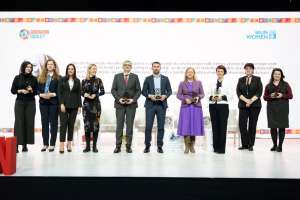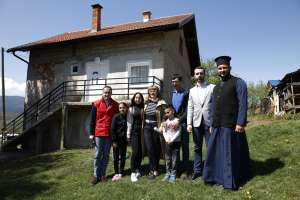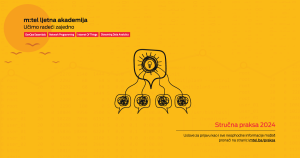SARAJEVO, March 27 (FENA) - After three years of implementation, key results of two projects „Standards and Engagement for Ending Violence against Women and Domestic Violence in Bosnia and Herzegovina” and “Ending Violence Against Women in the Western Balkan Countries and Turkey: Implementing Norms, Changing Minds” were presented and discussed at a conference UN Women organized last week in Jahorina.
Projects are implemented by UN Women in partnership with Gender Centers of Republika Srpska and Federation of Bosnia and Herzegovina, as well as civil society organizations.
The findings of the analysis of costs of domestic violence spurred a lot of interest by participants. The cost of the multisectoral response to domestic violence in BiH was estimated at 65 million KM annually, based on 3000 reported cases of violence in 2016 and 2017 in 6 locations targeted by the research.
During the presentation of the research findings, UN Women representatives emphasized that estimated costs of services provided by centers for social work, police, justice and health sector, as well as specialist support services provided by civil society organizations amount to 29 million KM annually.
The rest of the costs are borne by survivors of violence through expenses related to transportation, counseling, medicines, but also in terms of opportunity costs related to the inability to generate income during rehabilitation.
The organizers of the conference underlined the fact that domestic violence and violence against women in BiH is still vastly underreported, making the findings of the study even more alarming.
“Our efforts under these projects have been focused, among other, on transforming traditional stereotypes about masculinities,” remarked David Saunders, UN Women Representative in BiH.
"Over 6000 young people from 40 high schools in BiH have been reached through prevention programs, and over 1200 service providers have been trained on standards for prevention and response to violence against women and domestic violence,” added Mr. Saunders.
It has been almost 5 years since the ratification of the Istanbul Convention, during which considerable efforts were invested in harmonization of the legislative framework and policies regulating domestic violence and violence against women, resulting in 32 local policies being better aligned with the Istanbul Convention.
"Criminal Code of Republika Srpska is now mostly aligned with the provisions of the Istanbul Convention. Having in mind that the definition of „woman“ under this Convention includes girls under the age of 18, amendments to the law which pertain to criminal acts against this group of population render better protection from all forms of sexual exploitation and abuse,“ stated prof dr. Ivanka Marković, president of the Council on combating domestic violence of Republika Srpska.
"However, in order for this law to serve its purpose, there has to be an adequate penal policy of the courts which will enable all victims to feel protected and be able to trust the justice system. Otherwise, our legislative framework remains to function only on paper, and victims keep facing barriers to adequate protection,” stressed prof Marković.
Experts in the field of combating domestic violence agreed once more that criminal procedures last too long, and legal aid, psychosocial services an health protection are still unequally accessible to survivors. Court practice often depends on the commitment of judges since there is no mechanism which makes sure laws are enforced uniformly.
"The lack of systematic approaches in implementation of existing legislation, as well as inadequate response of institutions to cases of violence points to government's failure to act. There is an entrenched fear of the system, and it is discouraging to realize that victims are afraid of institutions in their own country,” explained professor Džamna Duman, from the Sarajevo Faculty of Law.
SOS helplines for victims of violence in both entities of BiH refer calls to the geographically nearest safe houses, a total of 8 in BiH. In the Federation of BiH the by-law regulating establishment and financing of safe houses has not yet been adopted. Safe houses, which have been providing shelter and support to survivors of violence for over 20 years, have been run by civil society organizations and have relied heavily on donor funds. Victims of violence are entitled to social protection in 5 cantons in FBiH, and the situation is additionally aggravated in cases where women and girls victims of violence also belong to a marginalized group of population. In Republika Srpska the government has recognized the importance of safe houses and made sure the services they provide to survivors are funded by the government.
"My sister is a person with disabilities, and already in first grade of primary school her teacher suggested she leaves regular education because she could not or did not know how to deal with my sister's health condition,“ says Dajana Ilić, attempting to shed more light on the complexity of recognizing and responding to violence against marginalized groups.
"Her entire education was marked by violence – physical and psychological. Our mother quit her job in order to be able to wait in front of the classroom door trying to protect my sister because the school, the principal, and the entire system was not able to, or did not have the will. Any form of violence is absolutely unacceptable, especially against girls and women who are unable to protect themselves,“ Dajana Ilić adds, saying that today she is an active member of the Association „Budućnost“ from Modriča, which works on protection of rights of women and children subjected to violence.
The two-day conference held last week saw participation of more than 50 representatives of key government and civil society actors, local service providers and experts in the field of violence against women and domestic violence. It was organized within the project „Standards and Engagement for Ending Violence against Women and Domestic Violence in Bosnia and Herzegovina“, implemented by UN Women in partnership with the Gender Centers of Republika Srpska and Federation of BiH, and civil society organizations. The project is supported by the government of Sweden and realized in strategic partnership with the Agency for Gender Equality BiH, stated the UN Women in BiH.
(FENA) S. R.












